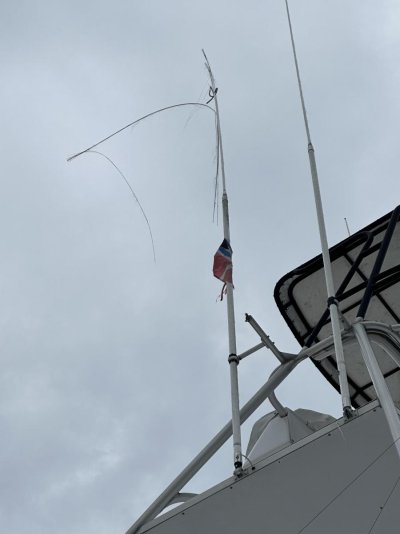hmason
Guru
- Joined
- Aug 9, 2013
- Messages
- 2,828
- Location
- USA
- Vessel Name
- Lucky Lucky
- Vessel Make
- Pacific Mariner 65
On Saturday last we experienced a vicious thunderstorm with high winds, thunder and lightning. A bolt of lightning hit the water behind our slip. The picture is of the VHF antenna on the boat next to ours.
The next morning our engines wouldn't start and our Garmin displays displayed incorrect information and did not display AIS at all. We are insured by BoatUS/Geico; I called and reported the incident. Within 2-days they assigned an adjuster and a surveyor to our claim. The surveyor came today. He took numerous pictures but would not let me turn anything on.
The surveyor told me to engage a CAT technician, a Northern Lights generator tech, a Garmin electronics expert, a marine electrician, a stabilizer tech and to have them go over every system on the boat and to provide repair estimates. He said to ask the electrician to start at the shore power cords and check out every circuit on the boat. He said that the owner, family and guests' safety is their primary concern. I must say, I'm impressed.
The next morning our engines wouldn't start and our Garmin displays displayed incorrect information and did not display AIS at all. We are insured by BoatUS/Geico; I called and reported the incident. Within 2-days they assigned an adjuster and a surveyor to our claim. The surveyor came today. He took numerous pictures but would not let me turn anything on.
The surveyor told me to engage a CAT technician, a Northern Lights generator tech, a Garmin electronics expert, a marine electrician, a stabilizer tech and to have them go over every system on the boat and to provide repair estimates. He said to ask the electrician to start at the shore power cords and check out every circuit on the boat. He said that the owner, family and guests' safety is their primary concern. I must say, I'm impressed.

